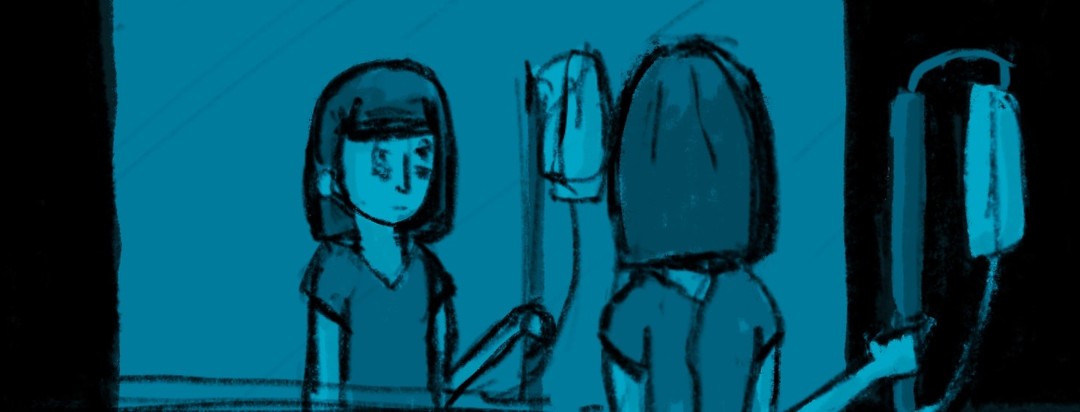What’s It Like to Experience an IBD Flare?
When a loved one or friend says they're "flaring," you may wonder what they mean. You may question how serious it is, how painful it is, or what this means for the person going through it. Unless you live with Crohn's disease or ulcerative colitis, it's impossible to truly grasp how a flare-up flips your world upside down.
As someone who's battled Crohn's for more than 13 years, I've unfortunately experienced my fair share of flare-ups that required hospitalization. Lucky for me, since bowel resection surgery in 2015, I have not had a flare-up that required medical attention. Please knock on all the wood around you!
Vivid memories of flares
Despite the 3 years outside of hospital walls, the pain, exhaustion and emotional aspect of my past flares lives vividly in my memory, and always will.
I can go back to each flare-up, remember exactly how it started, how it felt to drive to the hospital, and what it was like enduring countless tests, pokes and prods. When you experience something like this, it stays with you. It's traumatic. It's gut-wrenching. It's something many people push under the rug or choose not to talk about.
A simple "get well soon" card doesn't do the trick. When you're released from the hospital, it's not an ending to a flare, but often only the beginning. Medications are often updated or changed, and recovering physically, mentally and emotionally begins. You are not the same. It's a setback in every sense of the word.
The signals of an approaching flare
After your first flare that requires hospitalization and as time goes on with your IBD battle, you get an innate understanding of the signals your body is trying to tell you. You know when to listen. You know when it's something you can't control on your own. Determining when to seek medical attention is something that always weighs on me.
I'll go back and forth in my mind. Give myself a few more hours and see if things get better. Personally, once the vomiting begins or the fevers strike, I know it's time to head in.
You know a hospital stay is likely
Showing up to the emergency room is emotional for many reasons. For one, deep down with IBD, many of us know the likelihood that we'll be admitted is very high. I always pack a hospital bag every time I go to the ER, knowing that I won't be going home.
There have only been 2 times where I've gone to the ER and not been admitted. You know you're about to undergo testing that involves drinking disgusting concoctions of liquid. You know there will be IV pokes and medications that ease the pain but can also make you feel sick. You know test results can paint a clearer picture of the culprit, a culprit that could result in surgery, a long hospitalization, or changing up your medication. You know steroids are probably in your future. It all starts playing out in your mind, because you know.
A Crohn's or UC flare is emotional
You know what's going to go down and you know this won't be your last time experiencing it. There is no end in sight. The feelings of frustration and worry fill you up until you're overcome with emotion. An emotion that can be released as sadness or anger to those around you. You may lash out at those by your bedside. Not because you are mad at them, but because you're mad at the situation.
When you stand tethered to your IV pole and look at your reflection in the bathroom mirror, you feel a sense of loss. You can't help but notice all the bruises from the needles, your darkened eyes, your body that begs for a shower. When you do laps around the hospital corridor you feel the eyes upon you, the strangers feeling sorry for you, wondering what's wrong with someone so young, who should be so vibrant.
Then, there's dealing with countless doctors, nurses and hospital personnel. There are those who will lift your spirits and there are those that will knock it down the moment they briskly walk through the door. The lack of compassion and empathy so many of us face throughout our patient journey from medical personnel is incredibly disheartening.
I remember getting a phone call. Yes, a phone call... from my former GI telling me I would need a bowel resection. It was my first surgery. I guess walking into the room and having a face-to-face conversation was too much of a burden on him.
Just be there for us
So the next time you're visiting us in the hospital, driving us to the ER or holding our hand on the couch before we make the decision to head into the hospital, know what thoughts are running through our minds. Take a moment to pause and recognize how raw and defeated we feel. And just be there. No judgment. No questions. Just be there. We'll share what we need and when we need it when we're ready.

Join the conversation